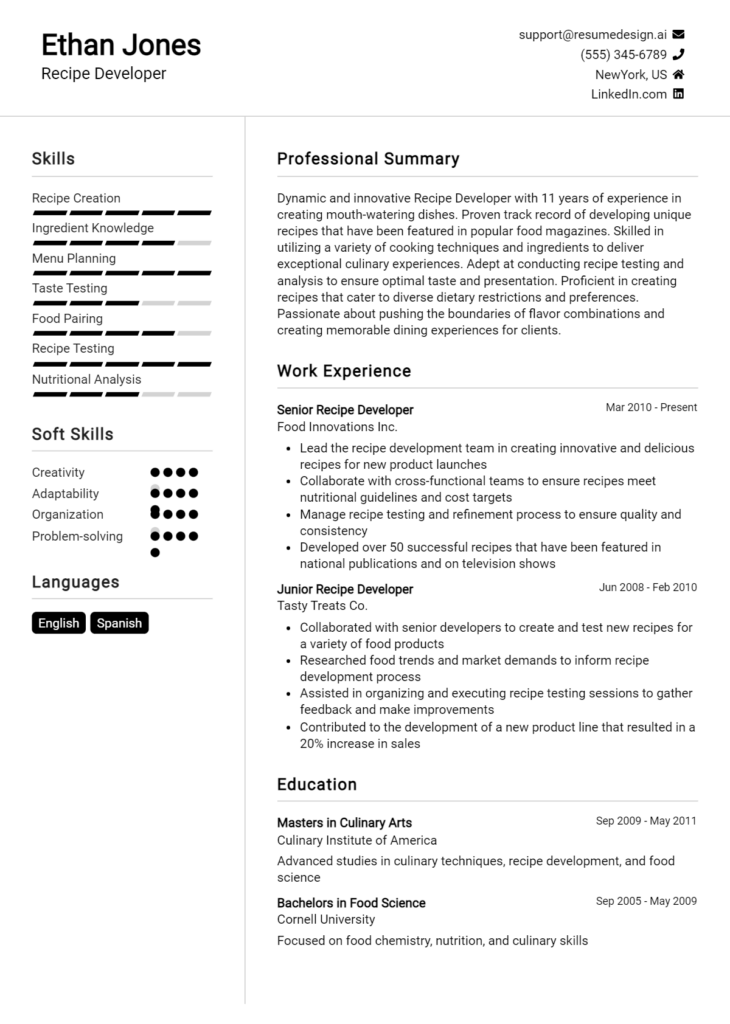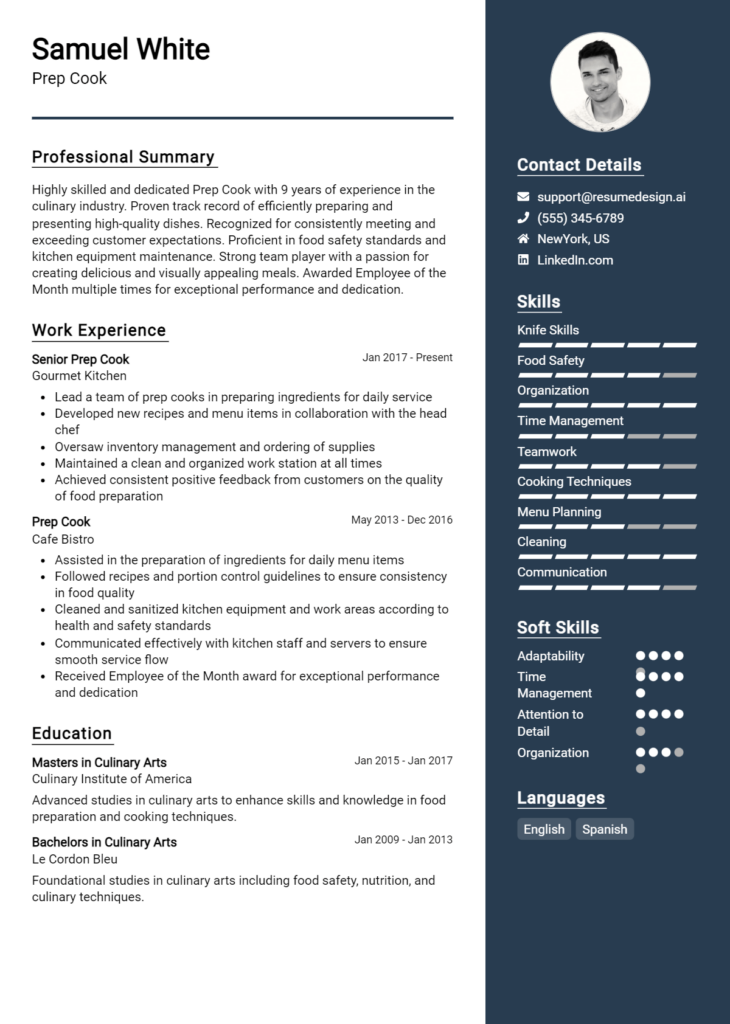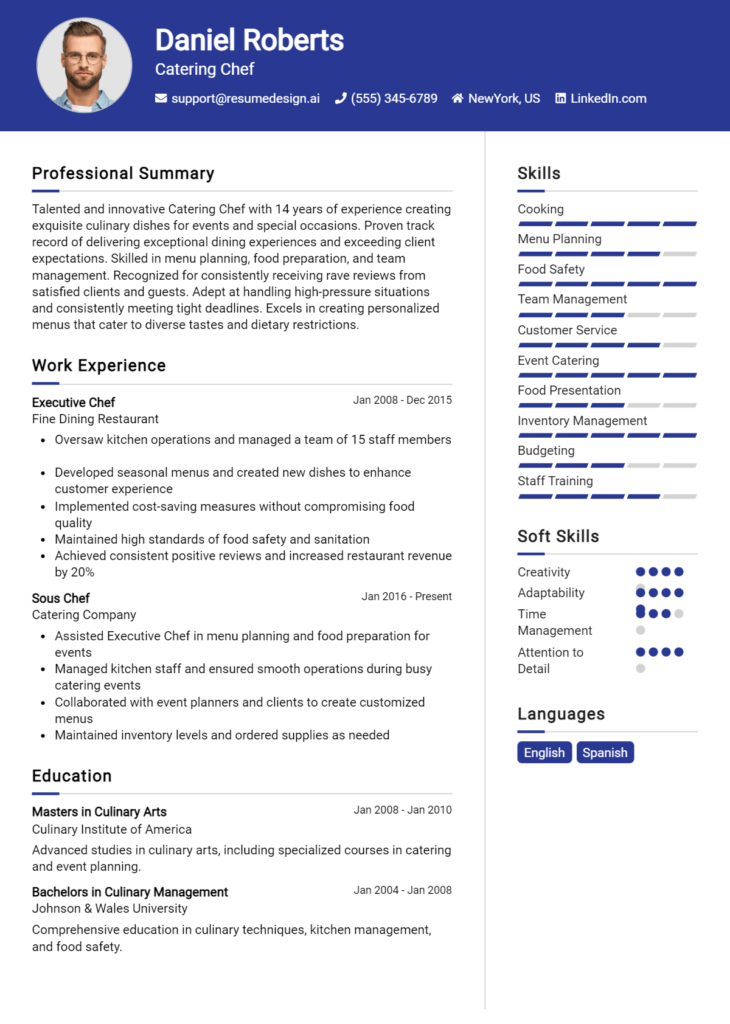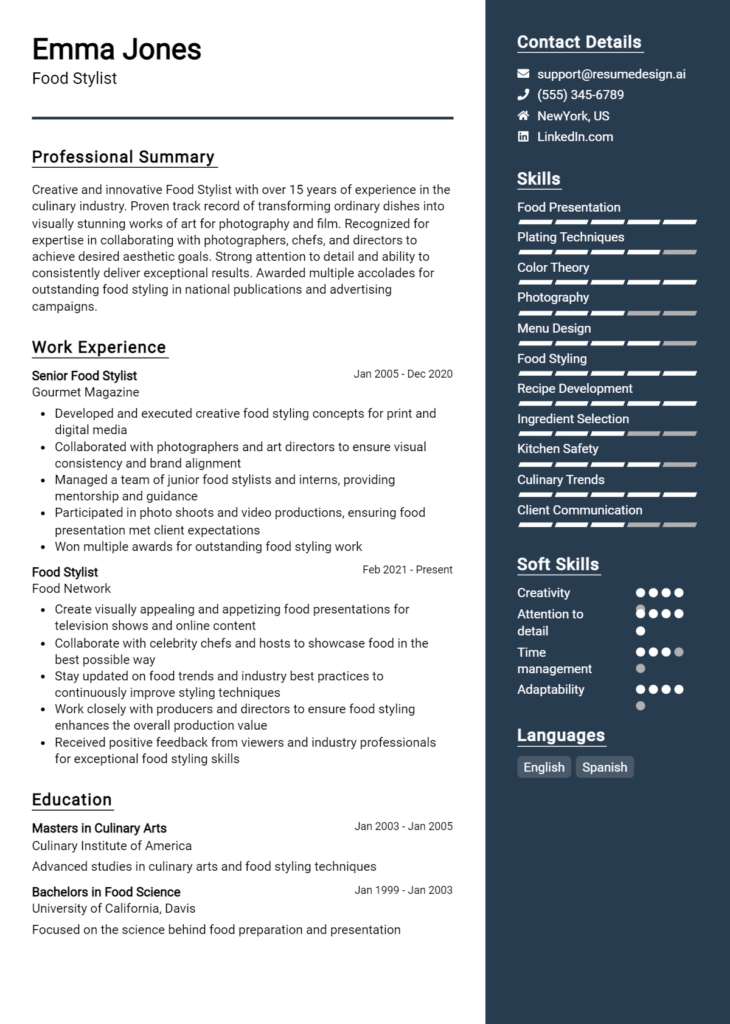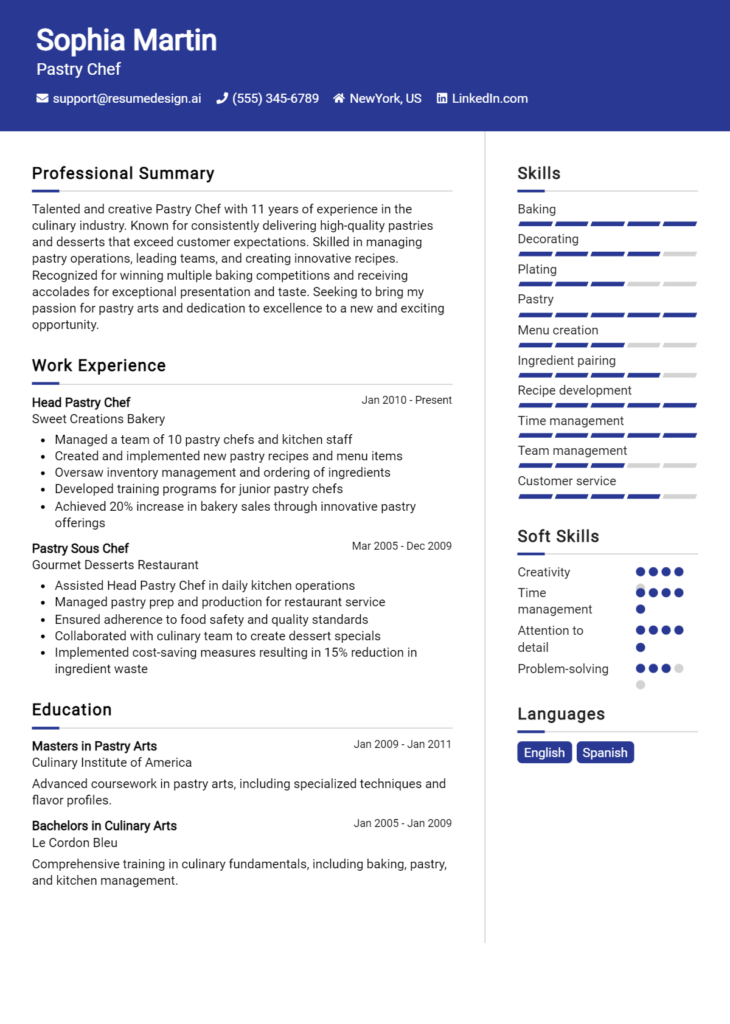Kitchen Manager Core Responsibilities
A Kitchen Manager plays a pivotal role in coordinating kitchen operations, ensuring food quality, safety standards, and efficient staff management. Key responsibilities include overseeing inventory, budgeting, menu planning, and staff training, requiring strong technical, operational, and problem-solving skills. This role bridges culinary and management functions, contributing significantly to organizational goals. A well-structured resume can effectively highlight these qualifications, showcasing a candidate's ability to enhance productivity and maintain high standards in a fast-paced environment.
Common Responsibilities Listed on Kitchen Manager Resume
- Supervise kitchen staff and coordinate daily operations
- Develop and implement menus in line with customer preferences
- Manage inventory, ordering, and supplier relationships
- Ensure compliance with health and safety regulations
- Train and mentor kitchen personnel to improve performance
- Control food costs and manage budgets effectively
- Maintain cleanliness and organization of the kitchen
- Collaborate with front-of-house staff for seamless service
- Conduct regular staff meetings to address issues and feedback
- Monitor food preparation and presentation for quality assurance
- Implement and optimize kitchen processes for efficiency
- Resolve customer complaints and ensure satisfaction
High-Level Resume Tips for Kitchen Manager Professionals
In the competitive culinary industry, a well-crafted resume serves as a crucial tool for Kitchen Manager professionals looking to make a lasting impression on potential employers. Your resume is often the first glimpse hiring managers have of your skills, experiences, and achievements, making it essential to present yourself in the best possible light. A strong resume not only highlights your culinary expertise but also reflects your leadership abilities, operational efficiency, and commitment to quality. This guide will provide practical and actionable resume tips specifically tailored for Kitchen Manager professionals, ensuring you stand out in a crowded field.
Top Resume Tips for Kitchen Manager Professionals
- Tailor your resume to each job description by incorporating relevant keywords and phrases that match the qualifications sought by the employer.
- Showcase your experience in managing kitchen operations, including staff supervision, inventory management, and budgeting.
- Quantify your achievements, such as "Reduced food costs by 15% through efficient inventory management" to demonstrate your impact on previous employers.
- Highlight industry-specific skills, such as knowledge of food safety regulations, menu planning, and culinary techniques that are relevant to the job.
- Include certifications that are pertinent to the role, such as ServSafe or a culinary degree, to enhance your credibility.
- Utilize action verbs to start bullet points, such as "Led," "Implemented," or "Developed" to convey a proactive approach.
- Keep your format clean and professional, using consistent fonts and spacing to ensure readability.
- Incorporate a summary statement that captures your career highlights and what you bring to a potential employer as a Kitchen Manager.
- List any technology or software skills, such as POS systems or kitchen management software, that are relevant to the role.
- Finally, proofread your resume carefully to eliminate any errors, as attention to detail is crucial in the culinary field.
By implementing these tips, you can significantly enhance your Kitchen Manager resume, increasing your chances of catching the eye of hiring managers and landing that coveted position in the culinary world. A well-structured and targeted resume not only showcases your qualifications but also reflects your professionalism and commitment to excellence in kitchen management.
Why Resume Headlines & Titles are Important for Kitchen Manager
In the competitive culinary industry, a Kitchen Manager's resume must stand out from the crowd, and this is where resume headlines and titles play a crucial role. A strong headline or title serves as the first impression for hiring managers, capturing their attention and summarizing a candidate's key qualifications in a succinct and impactful manner. By crafting a concise and relevant headline, candidates can immediately communicate their value, setting the tone for the rest of their resume. This strategic approach not only highlights their expertise and experience but also aligns their qualifications with the specific job they are applying for, making it easier for employers to recognize their suitability for the role.
Best Practices for Crafting Resume Headlines for Kitchen Manager
- Keep it concise: Aim for one impactful sentence that encapsulates your qualifications.
- Be role-specific: Tailor your headline to reflect the specific Kitchen Manager position you are targeting.
- Highlight key strengths: Focus on your most relevant skills, experiences, or achievements.
- Use industry keywords: Incorporate terminology commonly used in the culinary field to enhance visibility.
- Showcase accomplishments: If applicable, mention notable achievements or recognitions in your career.
- Avoid jargon: Keep the language simple and clear to ensure easy readability.
- Be authentic: Ensure the headline accurately reflects your professional identity.
- Update regularly: Revise your headline based on the specific job descriptions you are applying for.
Example Resume Headlines for Kitchen Manager
Strong Resume Headlines
Dynamic Kitchen Manager with 10+ Years of Experience in High-Volume Environments
Culinary Expert Specializing in Menu Development and Staff Training
Results-Driven Kitchen Manager with Proven Track Record in Cost Control and Waste Reduction
Innovative Kitchen Leader Committed to Enhancing Culinary Operations and Team Performance
Weak Resume Headlines
Kitchen Manager Seeking Job
Experienced Worker in Food Industry
The strong headlines are effective because they immediately convey the candidate’s qualifications and focus on relevant skills that align with the Kitchen Manager role. They utilize specific language that draws attention and highlights accomplishments, making a memorable impact. In contrast, the weak headlines fail to impress due to their vagueness and lack of specificity; they do not provide any compelling information about the candidate's unique qualifications or expertise, making it difficult for hiring managers to see their potential fit for the position.
Writing an Exceptional Kitchen Manager Resume Summary
Writing a compelling resume summary is crucial for a Kitchen Manager seeking to stand out in a competitive job market. The summary serves as a first impression, quickly capturing the attention of hiring managers by highlighting essential skills, relevant experience, and notable accomplishments. A strong summary should be concise yet impactful, tailored specifically to the job the candidate is applying for. This allows potential employers to easily recognize the applicant's qualifications and fit for the role, significantly increasing the chances of securing an interview.
Best Practices for Writing a Kitchen Manager Resume Summary
- Quantify achievements: Use specific numbers and results to showcase your impact, such as reduced food costs by a percentage or increased customer satisfaction ratings.
- Focus on relevant skills: Highlight key skills that are directly related to kitchen management, such as inventory control, staff training, and menu planning.
- Tailor the summary: Customize your resume summary for each job application to align with the specific requirements mentioned in the job description.
- Keep it concise: Aim for 3-5 sentences that pack a punch without overwhelming the reader.
- Use action verbs: Start sentences with powerful verbs to convey leadership and initiative.
- Showcase leadership qualities: Emphasize your ability to manage a team, handle conflicts, and inspire staff.
- Include certifications: Mention any relevant certifications, such as food safety or culinary training, to enhance credibility.
- Be authentic: Reflect your unique personality and passion for the culinary arts to make a lasting impression.
Example Kitchen Manager Resume Summaries
Strong Resume Summaries
Dynamic Kitchen Manager with over 10 years of experience in high-volume restaurants, reducing food waste by 30% and increasing kitchen efficiency by implementing new inventory management systems.
Results-driven culinary professional with a proven track record of enhancing menu offerings, leading to a 25% increase in customer satisfaction ratings and a 15% boost in repeat business within one year.
Dedicated Kitchen Manager skilled in staff training and development, successfully mentoring a team of 15 cooks to achieve a 20% improvement in kitchen productivity and a significant reduction in staff turnover.
Weak Resume Summaries
Kitchen Manager with some experience in running kitchens and managing staff. Good at cooking and preparing meals.
Experienced in various kitchen roles and looking for a new opportunity to work in a restaurant. Capable of managing a team.
The strong resume summaries effectively demonstrate quantifiable results and specific skills that are directly relevant to the Kitchen Manager role, showcasing the candidate's ability to drive performance and enhance operations. In contrast, the weak summaries are vague and lack measurable outcomes, making it difficult for hiring managers to gauge the candidate's true capabilities and fit for the position.
Work Experience Section for Kitchen Manager Resume
The work experience section of a Kitchen Manager resume is a critical component that highlights a candidate's technical skills, leadership abilities, and commitment to delivering high-quality culinary products. This section serves as a showcase of an individual's professional journey, demonstrating their capacity to manage kitchen operations, mentor team members, and ensure the highest culinary standards are met. By quantifying achievements and aligning their experiences with industry benchmarks, candidates can effectively illustrate their value to potential employers, setting themselves apart in a competitive job market.
Best Practices for Kitchen Manager Work Experience
- Highlight specific technical skills, such as inventory management, food safety compliance, and menu development.
- Quantify achievements using metrics, such as cost savings, revenue growth, or improvements in customer satisfaction scores.
- Emphasize leadership experiences, including team training, conflict resolution, and performance management.
- Focus on collaboration, showcasing successful partnerships with suppliers, kitchen staff, and front-of-house teams.
- Use action verbs to convey contributions and impact clearly.
- Align your experiences with industry standards and best practices, demonstrating knowledge of current trends.
- Include relevant certifications, such as ServSafe or culinary school credentials, to complement your work experience.
- Tailor the experience section to reflect the specific requirements and expectations of the job you are applying for.
Example Work Experiences for Kitchen Manager
Strong Experiences
- Successfully managed a team of 15 kitchen staff, resulting in a 30% increase in kitchen efficiency through streamlined processes.
- Implemented a new inventory management system that reduced food waste by 25% and saved $10,000 annually.
- Developed a seasonal menu that increased customer satisfaction ratings from 85% to 95%, leading to a 20% increase in repeat business.
- Trained and mentored junior chefs, resulting in 5 promotions within the team over two years and improved overall team performance.
Weak Experiences
- Helped with kitchen operations and staff management.
- Responsible for food preparation and cooking tasks.
- Worked with team members to ensure a smooth kitchen environment.
- Participated in menu planning and ingredient ordering.
The examples listed as strong experiences effectively demonstrate measurable outcomes and specific achievements that illustrate the candidate's capabilities and impact in previous roles. They reflect a proactive approach to management and a clear alignment with the responsibilities of a Kitchen Manager. In contrast, the weak experiences lack specificity and quantifiable results, making them less compelling and failing to adequately showcase the candidate's skills and contributions to potential employers.
Certifications and Education for a Kitchen Manager Resume
When crafting a resume for a Kitchen Manager position, it's essential to highlight both certifications and education that demonstrate your expertise in culinary management and food safety. Here’s how to effectively list these qualifications:
Certifications:
ServSafe Food Protection Manager Certification: This certification is crucial for any kitchen manager, as it covers essential food safety practices and regulations. It’s often required by law in many states and demonstrates your commitment to maintaining a safe kitchen environment.
Culinary Arts Certification: Obtaining a certification from a reputable culinary school can enhance your credibility. This may include a diploma or certificate in Culinary Arts, which showcases your foundational cooking skills and knowledge of kitchen operations.
CPR and First Aid Certification: Being trained in CPR and first aid is beneficial in any workplace, especially in high-paced environments like kitchens. This certification reflects your preparedness to handle emergencies, ensuring the safety of your team.
Management or Leadership Training: Courses or certifications in food service management, hospitality management, or leadership can set you apart. These programs often cover essential topics such as team management, conflict resolution, and effective communication.
Education Background:
Associate Degree in Culinary Arts: An associate degree from a recognized culinary school provides a solid foundation in cooking techniques, kitchen management, and food safety practices. This degree often includes hands-on training, which is vital for practical kitchen roles.
Bachelor’s Degree in Hospitality Management: A bachelor’s degree in hospitality management combines culinary training with business management skills. This education prepares you for higher-level roles in kitchen and restaurant operations.
Diploma in Food Service Management: A diploma focusing on food service management covers essential topics, including menu planning, inventory control, and staff management. This program is beneficial for those looking to specialize in the operational side of kitchen management.
High School Diploma with Culinary Focus: While not as advanced as a degree, having a high school diploma with coursework in culinary arts or related fields can still be valuable, especially when paired with relevant certifications and experience in the industry.
By prioritizing these certifications and educational backgrounds, you can create a strong resume that showcases your qualifications and readiness for a Kitchen Manager role.
Top Skills & Keywords for Kitchen Manager Resume
As a Kitchen Manager, possessing the right skills is crucial for the successful operation of any food establishment. A well-crafted resume that highlights both hard and soft skills can significantly enhance your chances of landing your desired job. Employers look for candidates who not only have technical expertise in kitchen operations but also possess interpersonal skills that foster a positive work environment. By showcasing your skills effectively, you can demonstrate your ability to manage kitchen staff, oversee food quality, and maintain operational efficiency.
Top Hard & Soft Skills for Kitchen Manager
Hard Skills
- Food Safety and Sanitation
- Menu Planning and Development
- Inventory Management
- Cost Control and Budgeting
- Cooking Techniques and Culinary Skills
- Knowledge of Kitchen Equipment
- Recipe Development
- Food Preparation and Presentation
- Staff Scheduling
- Nutrition and Dietary Restrictions
- Quality Assurance
- Compliance with Health Regulations
- Catering Experience
- Vendor Relations
- Supply Chain Management
- Time Management
- Culinary Software Proficiency
Soft Skills
- Leadership and Team Management
- Communication Skills
- Problem-Solving Abilities
- Adaptability and Flexibility
- Conflict Resolution
- Attention to Detail
- Customer Service Orientation
- Creativity and Innovation
- Multitasking Abilities
- Stress Management
- Empathy and Emotional Intelligence
- Training and Mentoring
- Decision-Making Skills
- Motivation and Inspiration
- Collaboration and Teamwork
- Positive Attitude
- Planning and Organizational Skills
To ensure a standout resume, incorporate these skills along with your work experience, providing a comprehensive view of your capabilities and experiences in the culinary world.
Stand Out with a Winning Kitchen Manager Cover Letter
Dear [Hiring Manager's Name],
I am writing to express my interest in the Kitchen Manager position at [Company Name], as advertised on [where you found the job listing]. With over [X years] of experience in culinary management and a proven track record of boosting kitchen efficiency and team performance, I am excited about the opportunity to contribute to your esteemed establishment. My passion for culinary excellence, coupled with my strong leadership skills, makes me a great fit for this role.
In my previous position at [Previous Company Name], I successfully managed a team of [number] culinary professionals, overseeing daily operations and ensuring that our kitchen maintained the highest standards of food quality and safety. I implemented streamlined processes that reduced food waste by [X%] and improved overall kitchen productivity. My commitment to fostering a positive work environment led to a [X%] increase in employee retention and satisfaction, as I believe that a motivated team is crucial to delivering exceptional dining experiences.
I am also adept at managing inventory, budgeting, and vendor relationships. At [Previous Company Name], I negotiated contracts with suppliers that resulted in a [X%] reduction in food costs without compromising quality. My focus on training and development has equipped my team with the skills needed to excel, ensuring that we consistently meet and exceed customer expectations. I am eager to bring my expertise in kitchen management and my innovative approach to menu development to [Company Name], helping to elevate your culinary offerings and enhance guest satisfaction.
I look forward to the opportunity to discuss how my skills and experiences align with the needs of your kitchen. Thank you for considering my application. I am excited about the potential to contribute to [Company Name] and help create unforgettable dining experiences for your guests.
Sincerely,
[Your Name]
[Your Phone Number]
[Your Email Address]
Common Mistakes to Avoid in a Kitchen Manager Resume
When crafting a resume for a Kitchen Manager position, it's essential to present your skills and experience effectively to stand out in a competitive job market. However, many candidates make common mistakes that can detract from their qualifications and reduce their chances of landing an interview. Avoiding these pitfalls will help you create a polished and professional resume that highlights your expertise in kitchen management.
Lack of Specificity: Failing to provide specific details about previous roles can make your experience seem vague. Include measurable achievements, such as the number of staff managed or budgetary responsibilities, to demonstrate your impact.
Ignoring Relevant Skills: Many resumes focus on general skills rather than those specific to kitchen management. Highlight skills such as inventory management, staff training, and menu planning that are crucial for the role.
Overly Long Resumes: A resume that is too lengthy can lose the reader's attention. Aim for a concise format, ideally one page, focusing on the most relevant experiences and accomplishments.
Inconsistent Formatting: Using inconsistent fonts, bullet points, or spacing can make your resume look unprofessional. Stick to a clean, uniform format throughout to create a polished appearance.
Neglecting Keywords: Many employers use applicant tracking systems (ATS) to screen resumes. Failing to include relevant keywords from the job description can result in your resume being overlooked. Tailor your resume for each application.
Lack of Action Verbs: Using weak language or passive voice can undercut your achievements. Start bullet points with strong action verbs like "managed," "developed," or "implemented" to convey a sense of initiative and accomplishment.
Forgetting Soft Skills: While technical skills are important, soft skills like leadership, communication, and teamwork are equally vital for a Kitchen Manager. Highlight these qualities to show that you can effectively manage a team and foster a positive work environment.
Omitting Certifications: If you hold relevant certifications, such as food safety or culinary credentials, be sure to include them. These qualifications can set you apart from other candidates and validate your expertise in the field.
Conclusion
As we have discussed, the role of a Kitchen Manager is vital in ensuring the smooth operation of any food service establishment. Key responsibilities include overseeing kitchen staff, managing inventory, ensuring food safety protocols are followed, and maintaining quality standards. A successful Kitchen Manager must possess strong leadership skills, culinary expertise, and the ability to work under pressure while maintaining a positive work environment.
To excel in this competitive field, having a polished resume that showcases your skills and experience is essential. Take a moment to reflect on your own Kitchen Manager resume and consider if it effectively highlights your achievements and qualifications.
We encourage you to utilize available tools that can help you create a standout resume. Check out our resume templates for a professional layout, our resume builder for an easy and guided creation process, and our cover letter templates to complement your application.
Don't miss the opportunity to enhance your job prospects. Revise your resume today and step confidently into your next Kitchen Manager role!

